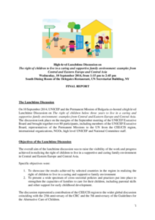On 10 September 2014, UNICEF and the Permanent Mission of Bulgaria co-hosted a high level Lunchtime Discussion on The right of children below three years to live in a caring and supportive family environment: examples from Central and Eastern Europe and Central Asia.The discussion took place on the margins of the September meeting of the UNICEF Executive Board and brought together over 80 participants, including members of the UNICEF Executive Board, representatives of the Permanent Missions to the UN from the CEE/CIS region, international organizations, NGOs, high level UNICEF and National Committee staff.
The overall aim of the lunchtime discussion was to raise the visibility of the work and progress achieved in realizing the right of children to live in a supportive and caring family environment in Central and Eastern Europe and Central Asia.
Specific objectives were:
- To showcase the results achieved by selected countries in the region in realizing the right of children to live in a caring and supportive family environment
- To present a wide spectrum of cross-sectorial policies and practices put into place to strengthen the capacities of families to care for their children, including parental skills and other support for early childhood development.
The discussion represented a contribution of the CEE/CIS region to the wider global discussion coinciding with the 25th anniversary of the CRC and the 5th anniversary of the Guidelines for the Alternative Care of Children. The discussion also represented an important follow-up to the 2012 Sofia conference, where twenty governments from Central and Eastern Europe and Central Asia joined forces to boost the growing movement to end placing children under three in institutions.
Themes of country presentations
The panelists presented different aspects of the child care reform taking place in the region with a view to exchanging experiences, identifying good practices and common challenges, as well as strategies to overcome them.
Bulgaria provided an overview of its ambitious de-institutionalization plan implemented since 2010 with the support of the European Union. The plan, developed through wide consultation with civil society actors, aims at closing institutions and replacing them with a range of community-based services. Particular attention is paid to the need to support families at risk, in order to prevent the separation of children unless this is in their best interest.
Croatia provided a comprehensive overview of how the country is developing and strengthening conducive policies to support vulnerable families and prevent family separation.
Serbia focused its presentation on the support provided to families of children with disabilities and the importance of investing in family-support services at municipal level.
Kazakhstan showed how the integration of social workers and outreach services in the health sector is reducing baby abandonment in pilot areas of the country.
Turkey highlighted the wide transformation of child services taking place in the country, shifting from institutional care to foster care and family-like care, but also through the provision of socio-economic support to vulnerable families to avoid family breakdown.

